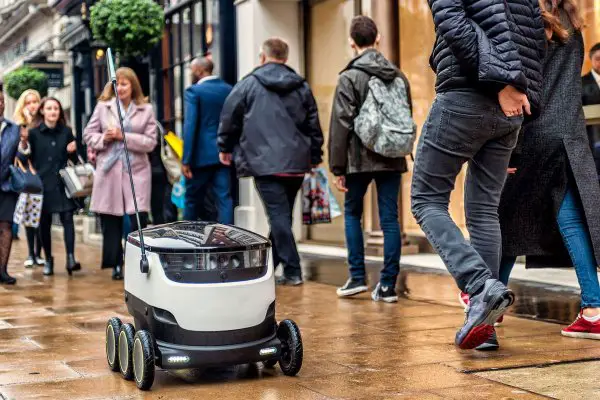Self-Driving Robots Are Delivering Food To Tech Workers In Silicon Valley

Starship Technologies is a robotics startups who recently announced its large-scale deployment of autonomous delivery robots. After more than 100,000 miles of experimental testing, the company plan to roll out 1,000 vehicles by the end of 2018.
Both corporate and academic campuses across Europe and the US can now enjoy the perks of having food brought to them by tiny Starship troopers that afford workers and students convenience. Each robot has six wheels, can move at a maximum speed of 4 miles per hour and is equipped with nine cameras and ultrasonic sensors which allow it to assess its surroundings and read traffic lights. To use the bot, users are required to order via an app, the restaurant then prepares the food and puts it inside the bot. The bot will then make its way to the entrance of a building and the user can then unlock the container by entering a unique code. The delivery takes between 15 and 30 minutes
Since January 2018, the tiny robots have served workers at a software company in Silicon Valley called Intuit. “We are ready to scale this,” Starship’s co-CEO Ahti Heinla explains. “So far, we have done commercial deliveries in other places as well. But these have been limited in the sense that we are still perfecting the service”.
“We aim to get to 99 per cent autonomy but we never have to get to 100 per cent,” he explains. “If there’s an edge case scenario which the software doesn’t know what to do with we can always slow to a stop and have an operator take control of the robot,” says Janus Friis, co-founder and co-CEO.
As artificial intelligence seeps into every aspect of our lives, it comes as no surprise that human couriers are being replaced by robots. What could be more convenient than picking up lunch without the need for human interaction? But not everyone is keen on these little bots cruising down a busy sidewalk. “Sidewalks, I believe, are not playgrounds for the new remote controlled toys of the clever to make money and eliminate jobs,” said Lorraine Petty, an activist with the community group Senior and Disability Action. “They’re for us to walk.” George Wooding, a local activist who uses a wheelchair, added: “You do not need a robot to deliver a ham sandwich. If you want one that badly, just go down and get it yourself.”
In December 2017, lawmakers in San Francisco voted to limit the number of sidewalk-patrolling robots to a maximum of nine across the entire city. In order to combat this, Starship Technologies have started working with city officials and have managed to get five US states to create laws that allow robots to operate on their pavements.
Leave Comment: